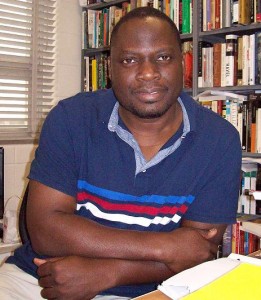Last week, Britain showed that it was on its way to joining the band of countries where gay marriage is legal. Using the figure of Oscar Wilde, Nigerian sociologist, Ebenezer Obadare, takes a look at the past and tells as that last week’s victory has been a long hard fight for equality and might mean that in Africa countries where Homosexuality is still legally prohibited, there is ground for optimism that things will change.
 On Wednesday February 5, British MPs voted on the question of whether or not to legalize same sex marriage. After a mostly civil five-hour debate, the legislation, proposed by Culture Secretary Maria Miller, Conservative MP from Basingstoke was passed by a majority of 225. Following this momentous outcome, the Marriage (Same Sex Couples) Bill will now go before the House of Commons for a second reading, after which it will have to take its chance in the House of Lords. But given the size of the majority in favour in the House (and significantly, the overall shift in popular opinion across Britain) the eventual outcome is not in doubt: Britain is effectively on course to join a small band of European and other countries where gay marriage is now legal.
On Wednesday February 5, British MPs voted on the question of whether or not to legalize same sex marriage. After a mostly civil five-hour debate, the legislation, proposed by Culture Secretary Maria Miller, Conservative MP from Basingstoke was passed by a majority of 225. Following this momentous outcome, the Marriage (Same Sex Couples) Bill will now go before the House of Commons for a second reading, after which it will have to take its chance in the House of Lords. But given the size of the majority in favour in the House (and significantly, the overall shift in popular opinion across Britain) the eventual outcome is not in doubt: Britain is effectively on course to join a small band of European and other countries where gay marriage is now legal.
For most people across the world, with the understandable exception of those who realized the significance of the moment and tuned in to the debates, the day broke and faded just like any other. Yet, it is difficult to think of a single event that encapsulates more succinctly the enormous transformation in social attitudes towards homosexuality, particularly in the United Kingdom. Here, essentially, was a vote codifying an act that many antagonists of same sex marriage had branded as the single most potent threat to the institution of ‘traditional’ marriage, the social equivalent of an earthquake; and yet, there was not even the faintest tremor. Instead, gay Britons, civil society and human rights organizations, and general supporters of gay rights celebrated a hard-earned victory. For the rest of us, life simply trundles along on its familiar axis.
The Irish wit, Oscar Wilde, who spent two hard years (1895- 1897) in jail after a conviction for “gross indecency”, would have appreciated the irony. Wilde was not the first person to be put away for practicing, as he memorably captured it, “the love that dares not speak its name.” But in late Victorian England, his was the most famous scalp. By the time of his conviction in 1895, Wilde was already a highly successful and critically acclaimed poet, essayist and playwright. His reputation as an artist was of a piece with his notoriety as a moral contrarian. In Wilde, art and ethics fused to produce some of the most perceptive insights about the human condition. Yet, to the extent that Wilde’s artistic project could be reduced to a single social mission, it was this: to expose the enormous hypocrisy at the heart of societal, read Victorian, morality. “Be yourself; everyone else is already taken,” he famously exhorted. Wilde couldn’t be anyone else, even if he tried, and for that, he paid a severe penalty.
As the law found common cause with late nineteenth-century polite society double standard, it was difficult for Wilde to imagine his own ultimate vindication, and some of what he wrote in prison afterwards showed quite clearly that he hardly expected to have the last laugh. For example: “Society, as we have constituted it, will have no place for me, has none to offer; but Nature, whose sweet rains fall on unjust and just alike, will have clefts in the rocks where I may hide, and secret valleys in whose silence I may weep undisturbed.”
No one can blame Wilde for not thinking or expecting too much of society or human institutions. After all, until 1861 (Wilde was born in 1854 in Dublin, Ireland), homosexuality was an offence punishable by death in England, and if the arc of the moral universe in sexual matters was bending toward toleration, there was little evidence to show for it. All of which makes what has transpired over the past one hundred years and more is nothing short of astonishing. For instance, Wilde could never have imagined his own admission into the Poets’ Corner, the famous portion of England’s Westminster Abbey where many august playwrights, poets and writers, including Charles Dickens, John Dryden, Thomas Hardy, Rudyard Kipling, Robert Browning, Samuel Johnson, and William Camden, currently rest. Wilde secured his admission on St. Valentine’s Day, 1995. Nor could he have countenanced the historic 1966 debate on legalizing homosexuality in England, the historic moment in December 2005 when the Civil Partnership Act became law, and finally, last week’s momentous vote in Britain.
With the crucial caveat that we are talking here about a struggle for equality in which it is still too early to sound the bugle of victory, the lessons from the British society’s gradual reconciliation with homosexuality are worth pondering. Primarily, it goes to show that even the most deep-seated prejudices can give way to new social mores. In this regard, it is important to note that one of the key arguments against same sex marriage is that it constitutes a violation of traditional marriage as an affair between a man and a woman. The argument gives way under the slightest pressure. For one, marriage as heterosexual monogamy is a recent cultural invention. Second, the idea of marriage as something essentially fixed is contradicted by its long history of change and revision. For instance, proponents of marriage equality make the point that until recently in the United States, heterosexual marriage across racial lines was categorically forbidden in the name of miscegenation.
The question of how social mores change is of course a tricky one. Part of it is just the passage of time, which tends to cast things in a different light. Greater education and increased public awareness also play a role. So does scientific progress, especially as research unveils new discoveries about human and animal sexuality, human nature, and human psychology.
All this is grounds for optimism about the situation across Africa, where currently, South Africa excepting, a needless and totally diversionary cultural perturbation is producing some of the most vile and hateful homophobic rhetoric. The origins are partly economic. They are also partly religious. In Nigeria especially, an open Bible or Quran is a mind closed. This has to change. For now at least, one imagines Wilde happy.
Ebenezer Obadare teaches Sociology at the University of Kansas, the United States









Sel February 13, 2013 13:08
Read this article thinking a glaring omission was the 'religion argument' but the final paragraph touches on it. This is, I believe, the major contending point in most African countries. For my part I'd echo, "Hate the sin. Love the sinner".